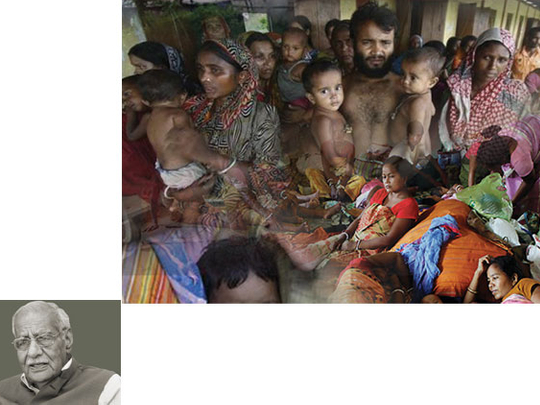
India’s northeast is in a combustible state. Some 250 ethnic groups are arrayed against one another and New Delhi to fight for their identity, some even seeking to break away from the Union. Religion-wise, the proportion of Hindus, Muslims and Christians is more or less the same. Infiltration, mostly from Bangladesh, has aggravated the problem. Even the Assamese, who were given a separate state in 1955 when India was reorganised on the basis of language, have become a minority.
The Bodos, an ethnic group which pushed part of Assam into a communal conflagration — the Bengali-speaking Muslims were the target — have even attacked relief camps. The Bodos want to take back land that infiltrators and outsiders have occupied since the British left in 1947. They also demand a Bodo state of their own, like any other distinctive group in India, even though they wield a lot of authority through their autonomous council.
While some ethnic groups separated from Assam and constituted their respective states — Arunachal Pradesh, Manipur, Meghalaya and Tripura — the Bodos preferred to stay with the state of Assam. But the administration at Guwahati has not been able to cope. The plight of Bengali Muslims in the state compelled Indian Prime Minister Dr Manmohan Singh to remark that “what happened in Assam is a blot on the nation”when he visited Kokrajhar, the hub of Bodos, and the scene of recent riots.
Yet why should Assam be singled out for the mess by New Delhi? In fact, the blot is on the Centre which has proved to be inept in handling the situation in the northeast.
New Delhi’s pet formula is that whatever happens in the northeast is a law and order problem. Already, the army has overall charge of keeping the peace with the help of paramilitary forces. Even the state police has to look up to the army which has repeatedly said that the problem is political. Apart from sending some home ministry officials to the northeast, there is very little that the centre has done to sort out the root of the problem.
To administer with a free hand, the army has the Armed Forces Special Powers Act (AFSPA), a draconian law, which authorises a soldier to kill a person on mere suspicion. The administration, wanting in all respects, depends on the armed forces. Therefore, it is not surprising to hear repeatedly that the army was late to reach a troublespot. Assam’s Chief Minister Tarun Gogoi has publicly blamed the deaths and destruction in the recent riots on the fact that the army came in late and the Centre withdrew nearly half of the paramilitary units when they were required to control the situation.
It is difficult to say why the army took three days to reach Kokrajhar when it was legally bound to come to the aid of civil authorities after a magistrate sent a requisition. One report says that the army did not want to get involved in communal riots while another claims that the overall command in Assam sought permission from the Ministry of Defence before acting.
If these reports are correct, they raise a very basic question: Is the army not bound to assist civilian authorities?
The matter requires a consensus among political parties, but they are busy quarrelling among themselves and avoiding the real issue. Both the Congress and the BJP governments at the Centre have found themselves out of depth with regard to solving the northeast’s problems.
Take the case of Nagaland, the largest state in northeast India. Since independence there has been a ceasefire between New Delhi and Kohima with both sides negotiating over a status which has the trappings of independence without diluting India’s sovereignty. Both repeatedly go over the exercise of finding a solution without anything concrete emerging.
Arunachal Pradesh, bordering China, is an Indian state. Yet New Delhi ‘accepts’ Beijing issuing a ‘separate’ visa for people of the state compared to the normal one issued to Indians.
Manipur is under curfew after sunset. There is Irom Chanu Sharmila, who is on a fast for the last 10 years, demanding the withdrawal of AFSPA. A few years ago a committee appointed by New Delhi suggested the withdrawal of the act but the armed forces had the last word and the Centre gave in.
Meghalaya faces the problem of ethnic identity. But people there have tasted peace and do not want to go back to the days of violence. Insurgency is there, but New Delhi feels satisfied that the neighbouring countries, both Bangladesh and Myanmar, no longer provide insurgents any shelter.
One problem accentuating the situation is infiltration. The Congress itself encouraged it in the 1950s to increase its vote tally.
The Congress should have at least implemented the accord between prime minister Rajiv Gandhi and the All Assam Students Union (AASU) to detect foreigners and delete their names from the electoral rolls. Gogoi does not want to do so because foreigners give the Congress an edge in elections. The last two elections in the state which he has won have been primarily because of ‘voters’ from across the border.
The Bangladeshis come to India for economic reasons. Had there been work permits, they would have got them and returned home after work. But there is no such provision. In any case, their problem should not be mixed with the northeast complexity still awaiting New Delhi’s serious attention.
Kuldip Nayar is a former Indian High Commissioner to the United Kingdom and a former Rajya Sabha member.










